Our Verdict
Samsung's 970 Evo is one of the fastest NVMe SSDs, with reasonable prices and up to 2TB capacities. It's not a massive change relative to the 960 Evo, but it's clearly better.
For
- Great NVMe performance
- Reasonably priced for NVMe
- Samsung reliability, drivers, and software
Against
- Costs more than 960 Evo for now
- Questionable speed benefits over SATA
PC Gamer's got your back
Samsung is one of the biggest players in the SSD market, thanks to its vertical integration. Unlike many competitors, Samsung makes its own NAND, controller, firmware, and drives. This gives it advantages in both pricing and performance, and Samsung has been at or near the top of the NVMe stack since it launched the 950 Pro in late 2015. The 960 Pro and Evo improved on the formula, with the Pro delivering higher performance while the Evo focused on delivering good but slightly lower performance at a substantially lower price. 18 months later, the Samsung 970 Pro and Evo repeat the story. They're basically the revised and improved version of the 960 lineup.
I'm looking at the 970 Evo today, and the changes are evolutionary rather than revolutionary. The 970 Evo's maximum performance is a bit faster than the 960 Evo. Samsung has also worked to improve throughput in mixed read/write workloads, which is closer to what most drives deal with on a regular basis. Samsung also shows minor improvements in performance at 'reasonable' queue depths. This is important, because in the real world very few workloads will go much beyond QD4, yet most SSD manufacturers report random IO for QD32. Samsung provides specs for both the QD1 and QD32 performance, which is something we hope other manufacturers will start doing (and some already do). Here's a look at the full specs:
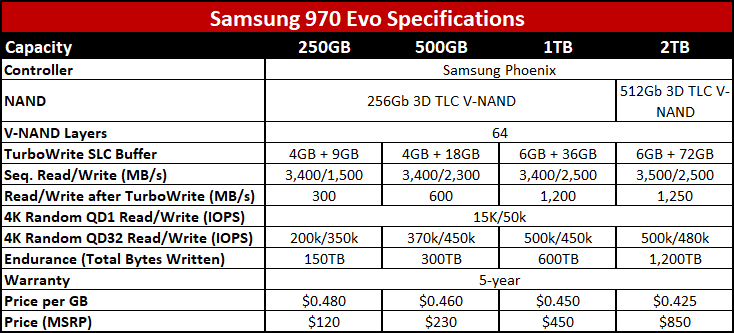
Compared to the previous generation, the 970 Evo has a few noteworthy changes. First, the new and 'enhanced' Phoenix controller has five cores, just like the preceding Polaris controller, one of which is dedicated to communication between the host system and the controller. It's clocked higher, though Samsung doesn't specify the exact clockspeed. Maximum capacity and endurance have both improved substantially, with a 2TB model now available—the 960 Evo topped out at 1TB. This is thanks to the move from 48-layer TLC V-NAND (aka, 3D NAND) to 64-layer TLC V-NAND, with the 2TB drive using 512Gb NAND die. Endurance scales directly with capacity, at a rate of 150TB written per 250GB—a 50 percent improvement compared to the 960 Evo line.
The various changes to the controller and V-NAND affect maximum read/write performance based on capacity as well. Where the 960 Evo topped out at up to 380k/360k on the 1TB model, and 330k/330k for the 500GB drive, the 970 Evo can do 500k/450k on 1TB and 370k/450k on 500GB. Maximum sequential throughput is up to 300/600MB/s faster (read/write) as well, though the QD1 IOPS hasn't changed too much. The warranty is also 5-years vs. 3-years. Finally, launch prices for all capacities are lower, though it's worth noting that the 960 Evo now sells for quite a bit less than the original launch price.
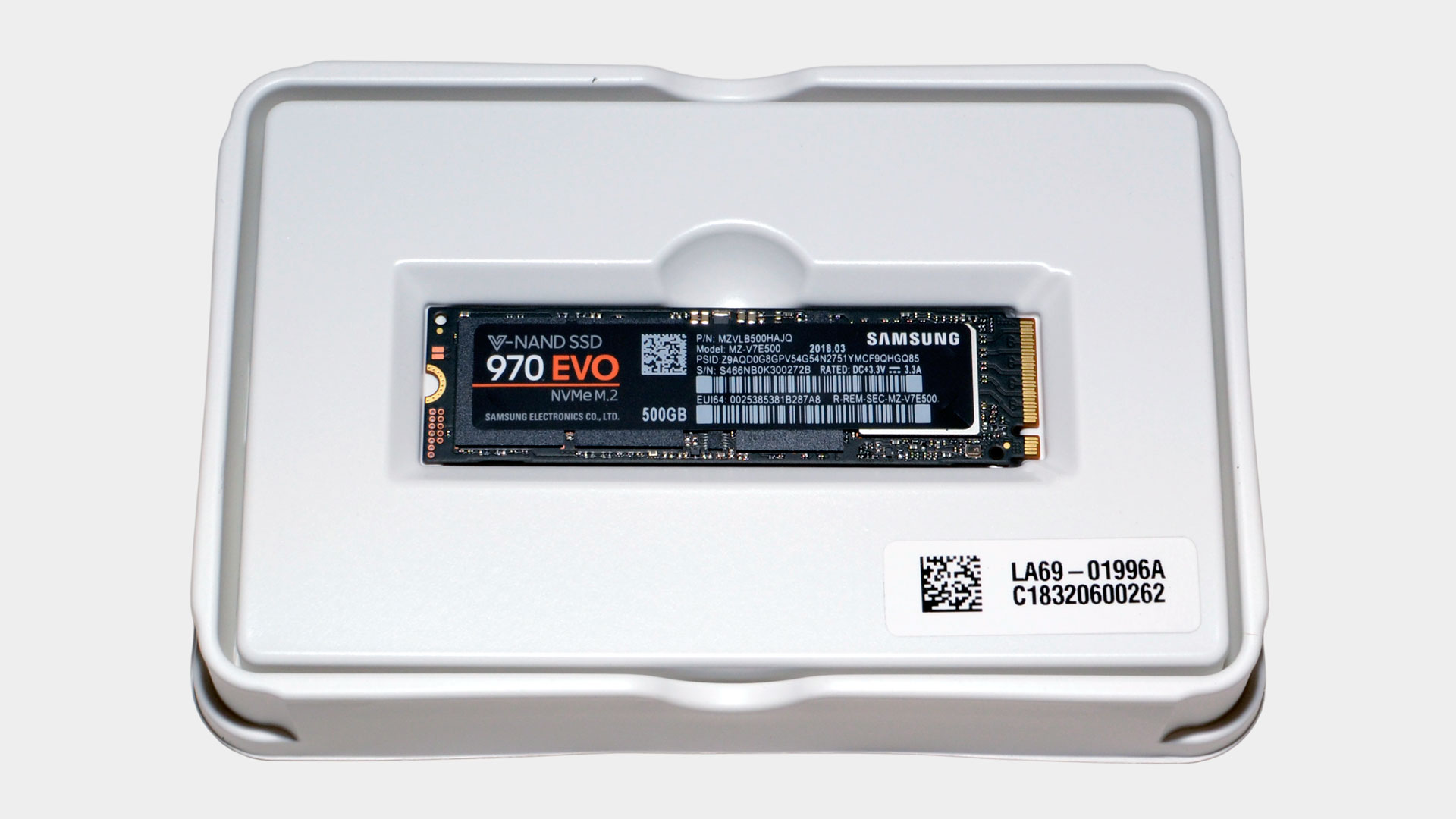
These are all clear steps forward, but the performance levels we're talking about are so fast that most users are unlikely to notice a massive change. In practice, most of the benefits of an NVMe SSD over a standard SATA SSD are only visible when you're doing heavy file manipulation, like copying files and folders or verifying all the files for a Steam game. For professional use, tasks like software development and compiling large projects, or running multiple VMs on a workstation, can also show the advantages of NVMe drives. The benchmarks show how much things have improved compared to SATA in more of a best-case scenario, but in practical everyday use on a gaming PC I don't normally notice the difference between an 860 Evo and the 960 Evo, never mind the 970 Evo.
I've highlighted the 970 Evo in the charts in green, with the 860 Evo 500GB included and highlighted in red to show how one of the fastest SATA drives compares. The other drives are all NVMe models, with some variation in capacity based on what I received for testing. Our SSD benchmark suite consists of a mix of theoretical and real-world metrics. Other tests are also run both to condition the drive and to ensure there are no oddities, but for the charts I focus on CrystalDiskMark, IOMeter (mixed read/write performance), file copying, and PCMark 8 Storage. I take the results (in MB/s) from eight of the tests and give each equal weighting (ie, geometric mean) to come up with the aggregate score. While it's impossible for a single number to tell you everything you need to know about an SSD, it provides a good high-level view of what to expect.
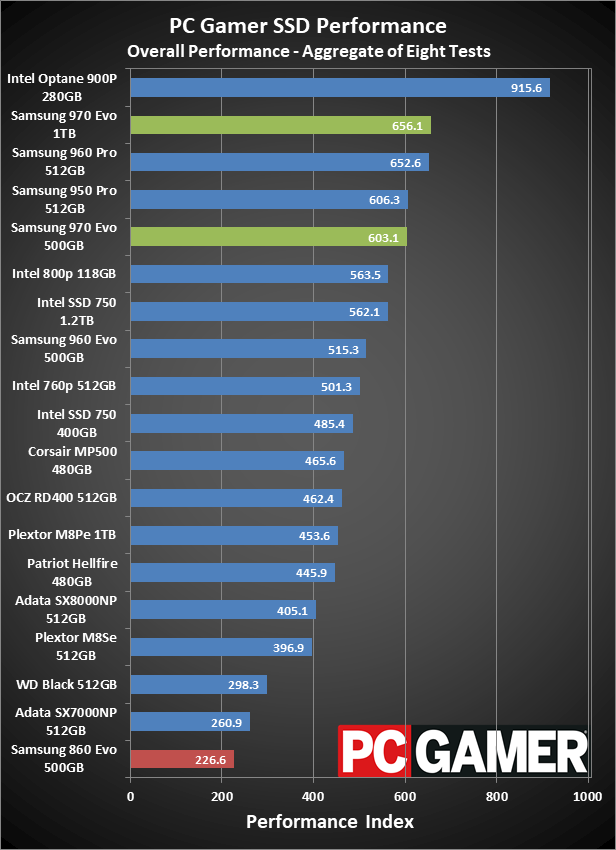
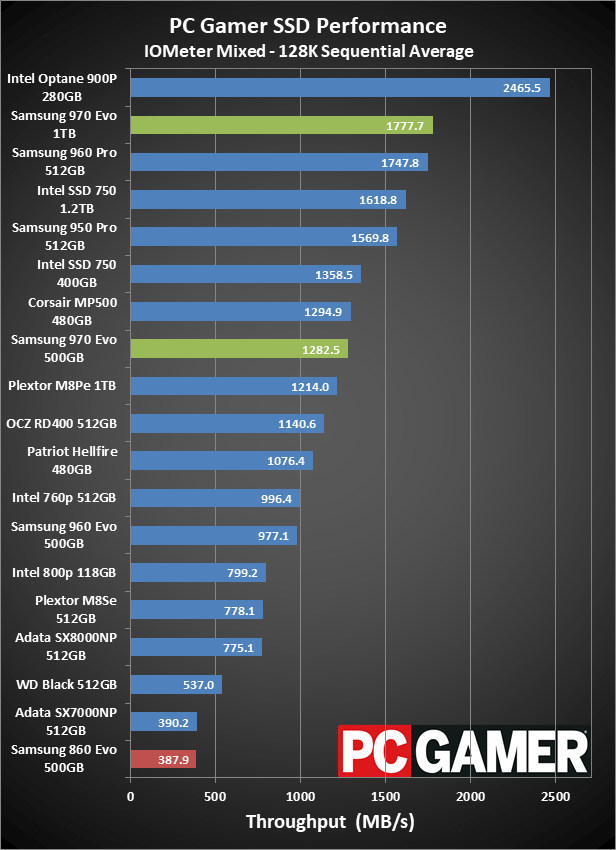
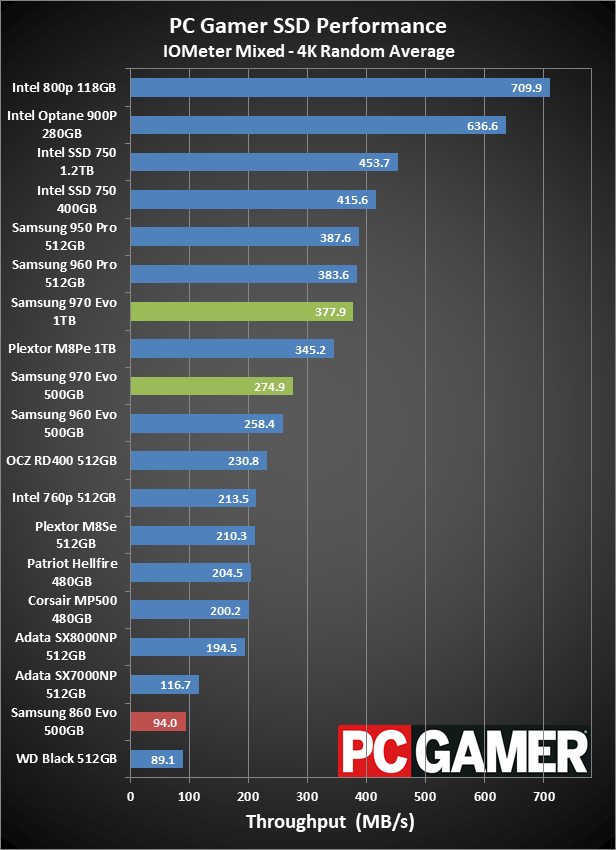
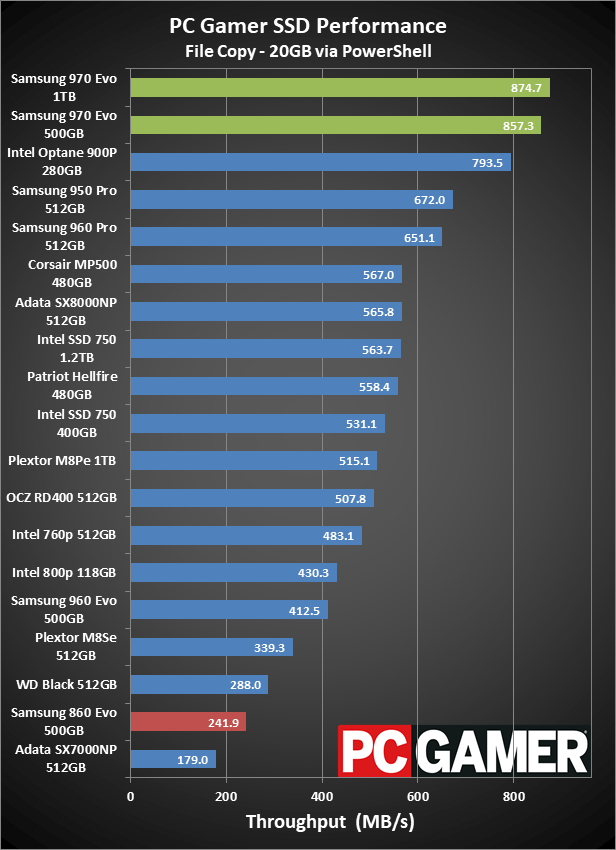
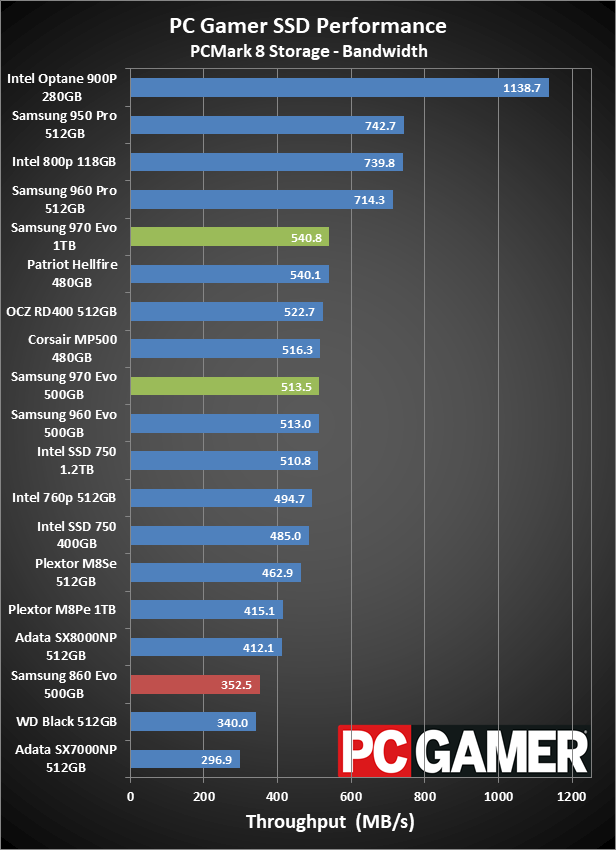
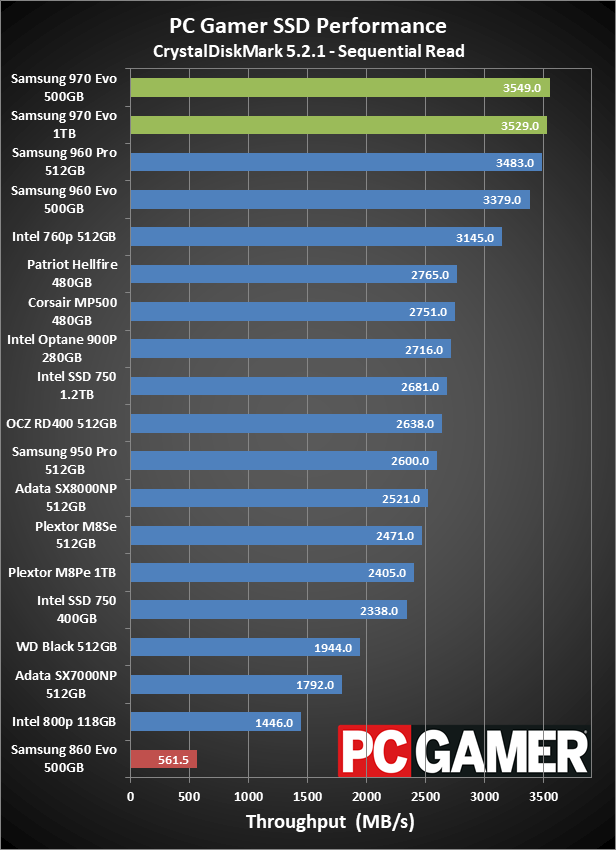
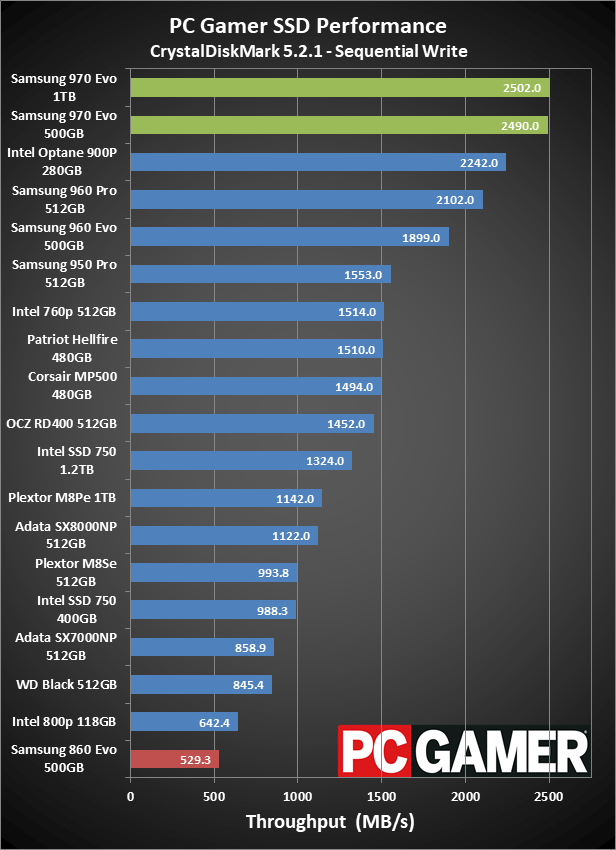
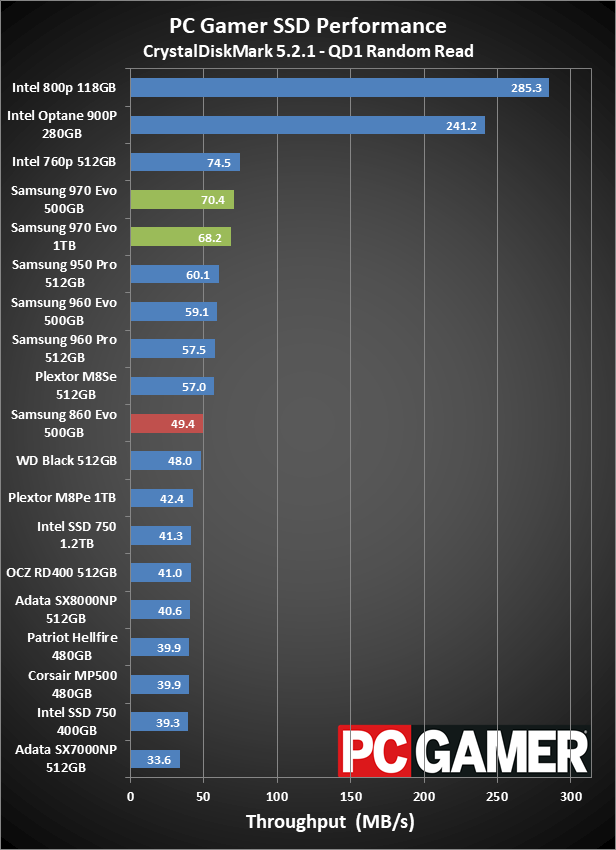
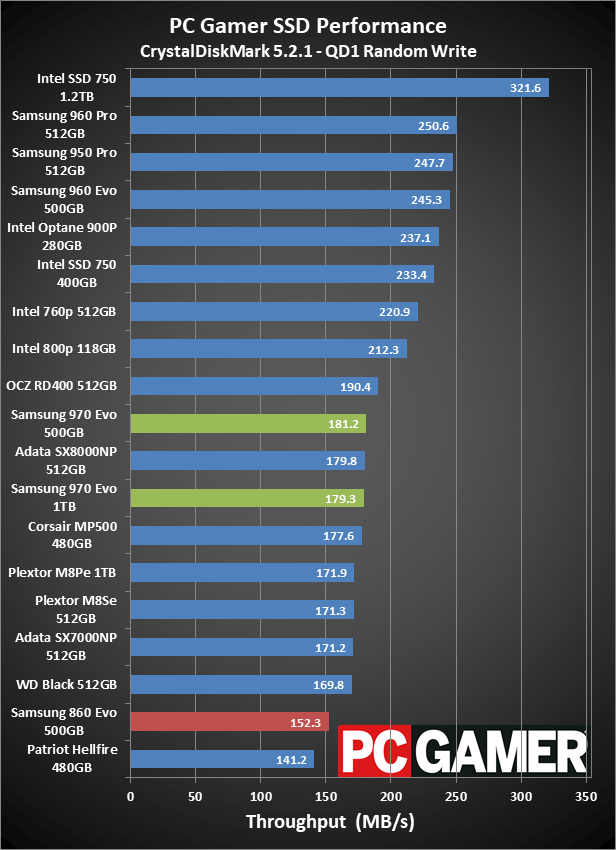
The 970 Evo rates near the top of the charts, with only the Intel Optane 900P really distancing itself from the other NVMe drives, but that's an add-in card and represents a slightly different market than M.2 drives. (The same goes for the Intel SSD 750.) Among the M.2 drives we've tested, the 970 Evo 1TB takes first place, and the 500GB model ranks fourth, with the 512GB 960 Pro and 950 Pro sitting in between. Compared to the 960 Evo 500GB, the 970 Evo 500GB beats it by 17 percent in our overall performance metric.
The 970 Evo is fast, but it's not the best SSD for gaming. That's because while games benefit from SSDs, they don't really need NVMe performance (at least not yet). But if you're looking for maximum storage speed, the 970 Evo will soon join our list of the best NVMe SSDs.
Looking at the individual charts, the sequential read/write performance is excellent, taking the top spot on the charts and slightly exceeding specs. QD1 random read speed is also good, with only the Optane drives really doing better. The 970 Evo also takes top honors for the real-world file copy test, beating even the 900P. That's a bit surprising, but the mixed sequential IOMeter results prove it's not a fluke. Mixed random read/write workloads in IOMeter aren't quite so impressive, and the PCMark 8 bandwidth score is perhaps a bit low (see the disclaimer below).
In the past 18 months, few NVMe SSDs have been able to come close to the 960 Evo, but the 970 Evo manages to beat it on all metrics. I do have some additional new NVMe SSDs that will be tested soon, but the 970 Evo is a welcome addition to the market. Assuming street prices eventually match or beat the 960 Evo, it will fully supplant it at the top of the M.2 NVMe heap.
A quick disclaimer:
I need to insert a short caveat here: nearly all my test results for other SSDs are from last year or earlier. Fixes for the Meltdown and Spectre exploits have been applied to the testbed (for both the OS and BIOS/firmware), and that appears to have impacted a few results—CrystalDiskMark QD32 4k results for example are substantially lower now on all the drives I've checked. Due to that change, I've elected to remove the QD32 results from the charts and aggregate score for now, until I have a chance to retest all the drives. The remaining numbers are being presented 'as is,' which if anything is likely hurting the 970 Evo slightly in the overall standings.
Going forward, I'm looking at including a benchmark that puts less of a focus on high queue depth results. While manufacturers routinely quote QD32 random IO performance, it's the least interesting of all the tests you might run. Very few applications in the real world (other than benchmarks) run at anything beyond QD4, and past QD8 is pretty much Fantasy Island territory.
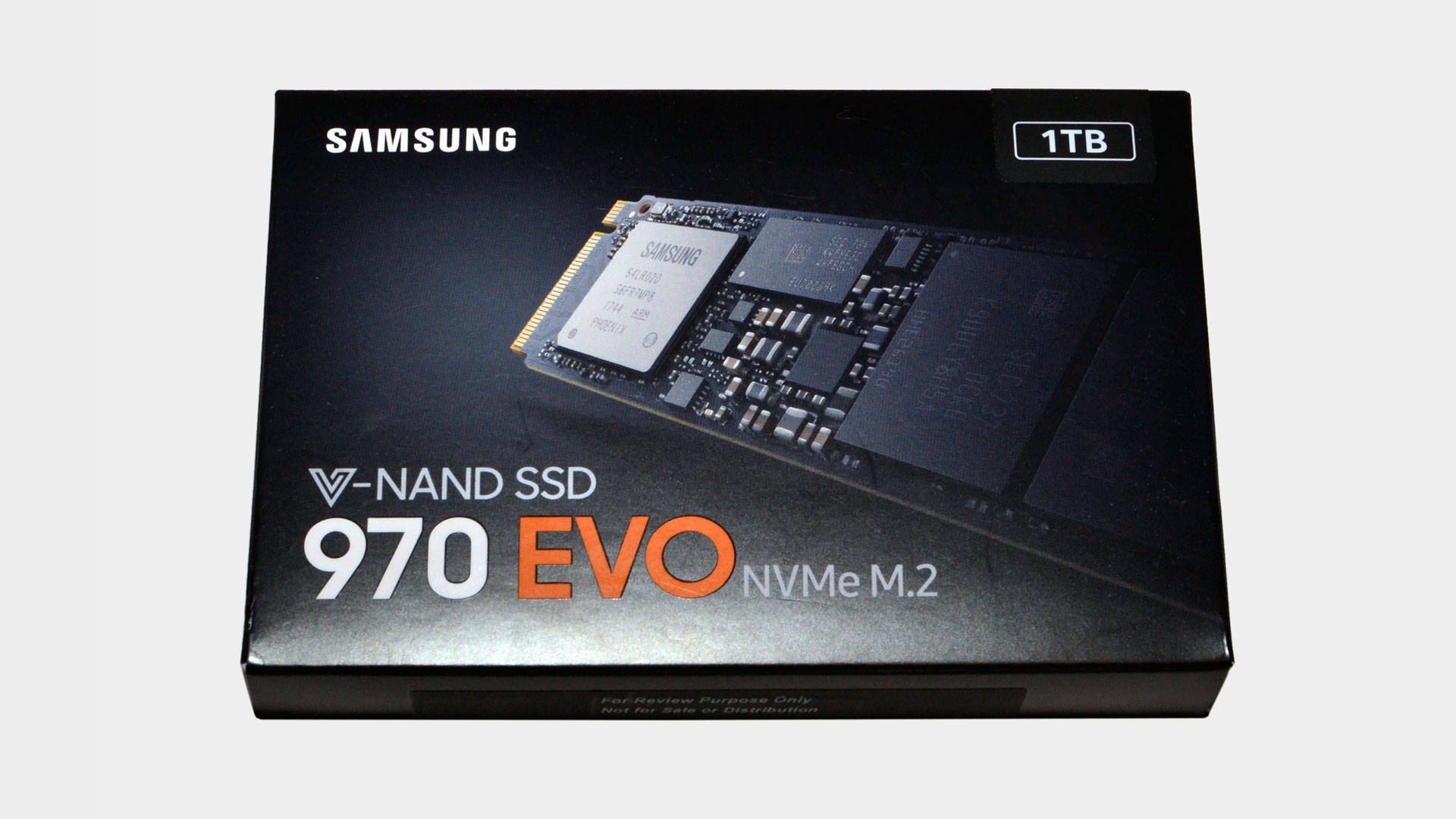
Samsung 970 Evo delivers welcome improvements in all areas
Samsung SSDs are a safe choice, whether you're looking at NVMe drives or SATA drives. They're rarely the cheapest drives for a particular form factor or interface, but the combination of performance, reliability, and price is tough to beat. The 970 Evo (and 970 Pro, though I haven't tested that yet) are the latest additions to the family, offering clear improvements in most aspects. Current prices are higher than the outgoing 960 Evo (and Pro), which remains a better overall buy for the time being, but if the past is any indication, that will change in the coming months as Samsung transitions away from the previous generation parts to the newcomers.
The difficulty with NVMe drives is that price per GB is often the deciding factor when shopping for SSDs, and SATA drives continue to hold a clear advantage. Our favorite SATA SSD right now is the 1TB Crucial MX500, which costs $0.25 per GB; Samsung's own 860 Evo 1TB costs only slightly more at $0.28 per GB. The Samsung 970 Evo 1TB costs 80 percent more for the same capacity, and that can be a bitter pill to swallow. I like the speed of M.2 NVMe drives, and not having to deal with cables can make for a cleaner build. However, for gaming purposes, you'll see almost no difference in load times between the 970 Evo and one of the better SATA SSDs.
Something else to point out is that we're now dangerously close to saturating the PCIe bus with x4 Gen3 connections, particularly for sequential transfers. The Samsung 970 Pro only boasts slightly better maximum throughput, likely because the x4 link doesn't let it shine. Both Intel and AMD also use an x4 PCIe link (basically) to connect the CPU to the PCH / chipset, which means using RAID 0 in many cases won't help either. It may not matter much for consumer workloads any time soon, but for datacenter workloads, moving to a faster link will be necessary to further increase storage performance.
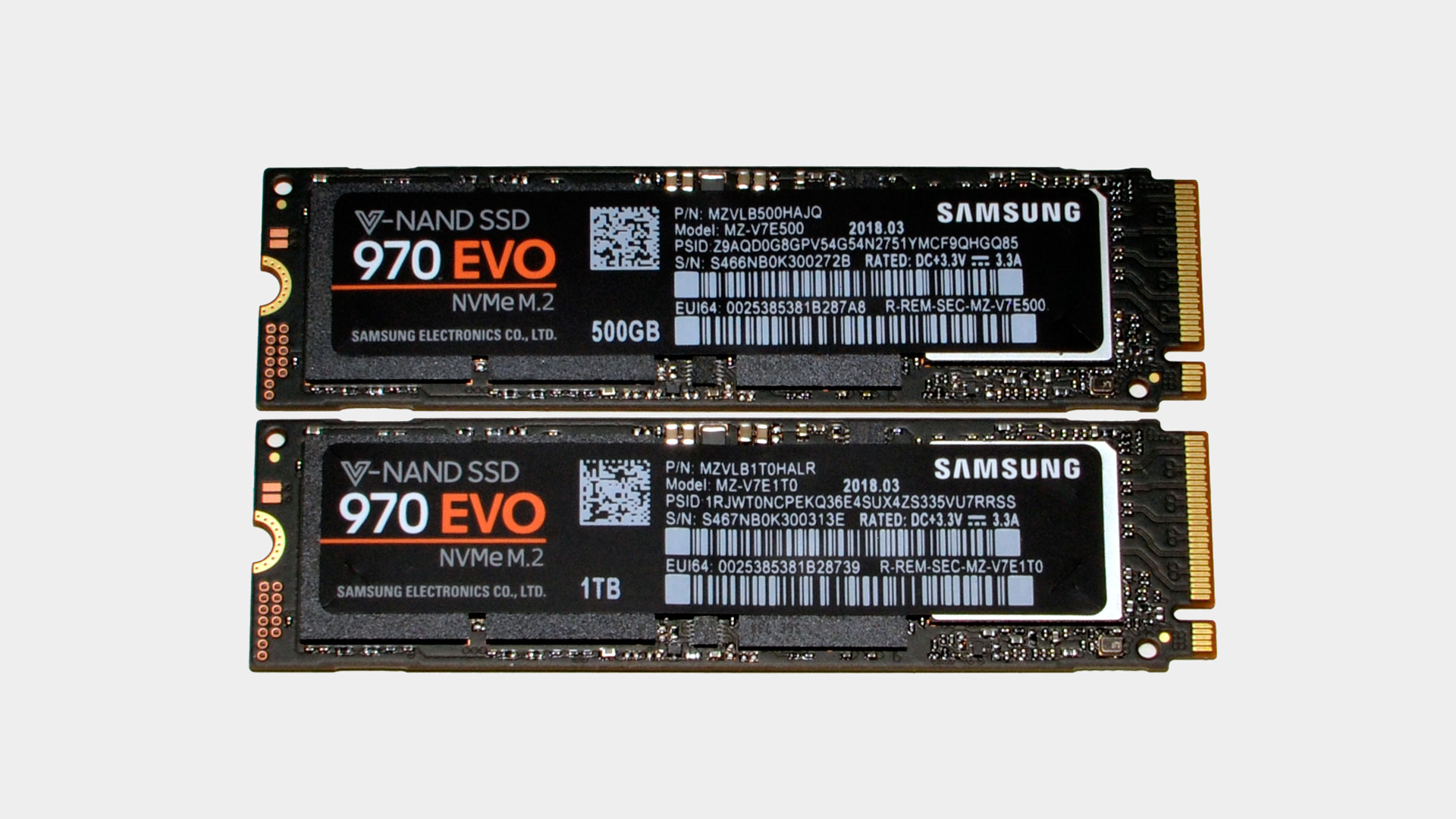
What matters most is your particular use case and budget, and that should dictate what sort of SSD you should buy. For most people, I would continue to recommend a larger 1TB SATA drive as a "one size fits all" solutions. If you don't want to spend a ton of money on storing your games, you'll also want to have a large hard drive available. You could pair a 250GB or 500GB 970 Evo with a 4TB HDD, and consider using software like PrimoCache or AMD FuzeDrive (the latter being for Ryzen systems). Personally, I refuse to even consider pure HDD solutions these days—they're painfully slow, particularly after you've been using SSDs for several years.
Samsung's 970 Evo is a great drive, and it deserves consideration along with plenty of other good SSDs. It's fast and has a reasonable price, as far as NVMe drives go, and comes with a longer warranty and improved endurance. Samsung is confident enough of their performance that we're able to review them several weeks in advance of retail availability. If you do plan on buying a 970 Evo when they go on sale May 7, though, don't be surprised if the initial prices are a bit higher than MSRP. You might need to wait a month or two longer before street prices drop.
Samsung's 970 Evo is one of the fastest NVMe SSDs, with reasonable prices and up to 2TB capacities. It's not a massive change relative to the 960 Evo, but it's clearly better.
Jarred's love of computers dates back to the dark ages when his dad brought home a DOS 2.3 PC and he left his C-64 behind. He eventually built his first custom PC in 1990 with a 286 12MHz, only to discover it was already woefully outdated when Wing Commander was released a few months later. He holds a BS in Computer Science from Brigham Young University and has been working as a tech journalist since 2004, writing for AnandTech, Maximum PC, and PC Gamer. From the first S3 Virge '3D decelerators' to today's GPUs, Jarred keeps up with all the latest graphics trends and is the one to ask about game performance.


